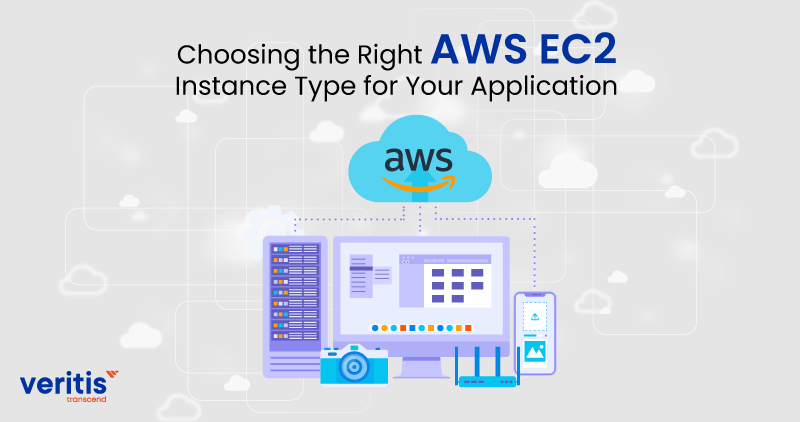
If you’re building and deploying applications on Amazon Web Services (AWS), you’re probably familiar with the Elastic Compute Cloud (EC2) service. EC2 is a web service that provides resizable computing capacity in the cloud, making it easy to build and deploy applications globally for various AWS EC2 instance types.
But with so many different EC2 instance types, how do you know the right fit for your application? In this article, we’ll look at EC2 and explore the different instance types available so that you can choose the best one for your varying EC2 instances.
Understanding EC2 and Its Evolution
To understand why EC2 is so essential for the AWS EC2 instance types, it’s helpful to take a step back and look at the history of virtualization. Virtualization is creating a virtual version of something, such as a server or operating system, using the software.
In the early days of virtualization, it was mainly used for testing and development. Developers could create virtual environments to test their code and configurations without physical hardware.
But as virtualization technology improved, it became possible to use it for production workloads. Virtualization allowed businesses to run multiple applications and OS on a single physical server, a significant cost saving compared to running each application on a separate server.
This is where EC2 comes in. EC2 is a web service that provides resizable computing capacity in the cloud. This means you can easily spin up new virtual servers (called instances or, in this case, EC2 instances) to run your applications and then shut them down when you no longer need them. EC2 makes it easy to scale your applications up or down based on demand, essential for ensuring optimal performance and cost-effectiveness.
Key Features and Benefits of EC2
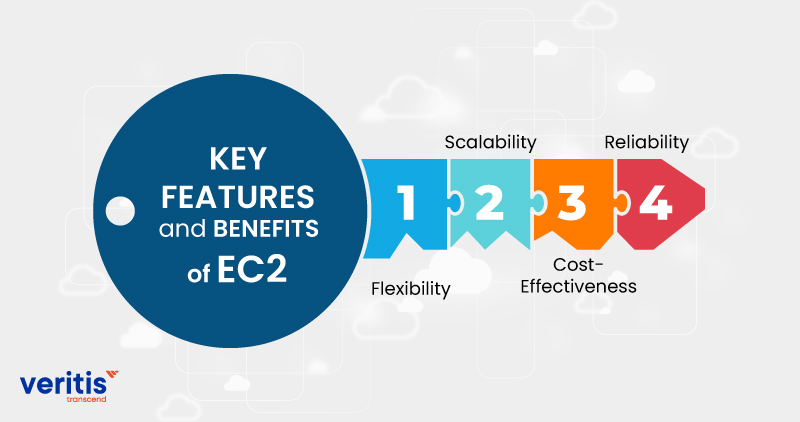
There are several key features and benefits of using EC2 for your Amazon EC2 instance types:
Flexibility: With EC2, you can choose from various EC2 instance types to meet your needs. This includes combinations of CPU, memory, storage, and networking resources.
Scalability: EC2 AWS ecosystem makes scaling your applications up or down easy based on demand. You can easily add or remove instances to ensure optimal performance and cost-effectiveness.
Cost-Effectiveness: With EC2, you only pay for what you use on the public cloud. This means you can spin up new instances when you need them and then shut them down when you no longer need them, saving you a significant amount of money compared to running on-premises servers.
Reliability: EC2 is designed to be highly reliable and available. It uses multiple availability zones (AZs) to ensure your applications are available even during an AZ outage.
Useful link: Top 7 AWS Cost Optimization Tools
EC2 vs. Traditional On-Premises Servers
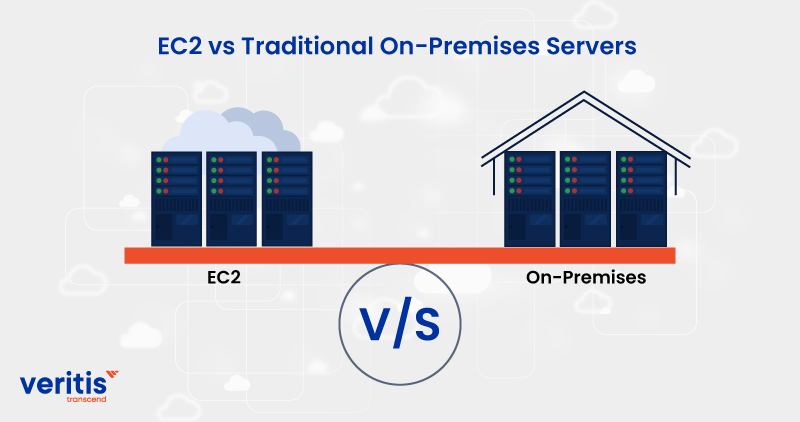
EC2 is fundamentally different from traditional on-premises servers in several ways. Here are a few key differences:
Infrastructure: With traditional on-premises servers, you must purchase and maintain physical hardware, such as servers, networking equipment, and storage. With the AWS EC2 instance types, all of this infrastructure is managed within the AWS ecosystem, saving you significant time and money.
Scalability: Scaling traditional on-premises servers can be difficult and time-consuming. You must purchase and install new hardware, configure it, and then integrate it with your existing infrastructure. With EC2 instances, you can easily scale your applications up or down based on demand without worrying about hardware.
Availability: Traditional on-premises servers are typically housed in a single location, which can make them vulnerable to outages and other disruptions. With EC2, your applications can be distributed across multiple availability zones, improving availability and reducing the risk of downtime.
Cost: Traditional on-premises servers can be expensive to purchase and maintain. You must pay for the hardware, electricity, cooling, and other infrastructure required to keep it running. With EC2, you only pay for what you use, which can be significant cost savings.
EC2 Competitors
While EC2 is a powerful and flexible cloud computing service, it’s not the only option available. Here are a few of the main EC2 competitors:
Microsoft Azure Virtual Machines: Microsoft Azure offers a similar virtual machine service to EC2. It provides many instance types and has a similar pay-as-you-go pricing model.
Google Compute Engine: Google Compute Engine is a cloud computing service that allows you to run virtual machines on Google’s infrastructure. It offers a wide range of instance types and is designed to be highly scalable and flexible.
IBM Cloud Virtual Servers: IBM Cloud offers a virtual server service that allows you to deploy and manage virtual machines in the cloud. It provides a wide range of instance types and has a similar pay-as-you-go pricing model to EC2.
Useful link: Which AWS Cloud Management Tools Should You Use to Manage Your Business
Why Choose AWS EC2?
While there are several EC2 competitors available, there are several reasons why EC2 in the AWS ecosystem is the best choice for many businesses:
Industry-Leading Infrastructure: AWS public cloud is widely regarded as the industry leader in cloud infrastructure. They have a massive global network of data centers and offer a wide range of cloud services, including EC2.
Flexibility: With over 300 different instance types available, AWS EC2 offers unparalleled flexibility. You can choose the exact combination of CPU, memory, storage, and networking resources to meet your specific requirements.
Scalability: AWS EC2 makes scaling your applications up or down easy based on demand. You can easily add or remove instances to ensure optimal performance and cost-effectiveness.
Cost-Effectiveness: With AWS EC2 instances types, you only pay for what you use. This means you can spin up new instances when you need them and then shut them down when you no longer need them, saving you a significant amount of money compared to running on-premises servers.
Choosing the Apt AWS EC2 Instance Types
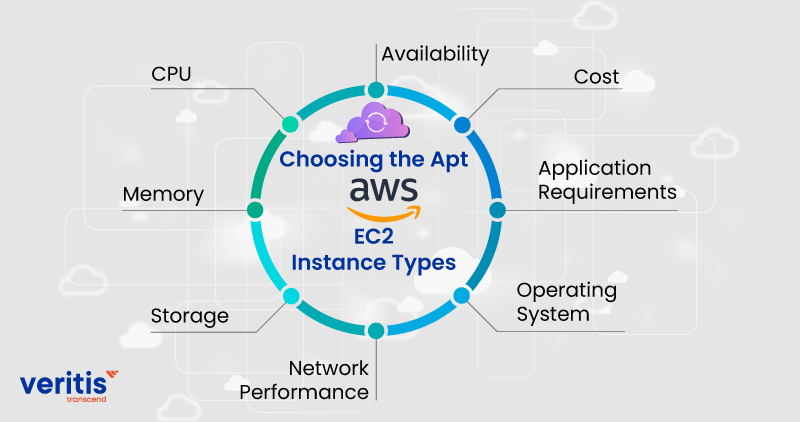
Now that we’ve covered the basics of EC2 and its advantages, let’s take a closer look at choosing the right EC2 instance type for your application. There are several factors to consider when selecting an instance type, including:
CPU: The amount of CPU you need will depend on the type of application you’re running. CPU-intensive applications, such as video encoding or data analysis, will require more CPU resources than primary disk or memory-bound applications.
Memory: The memory you need will depend on your dataset’s size and your application’s complexity. Applications that require a lot of data processing or analytics will typically require more memory.
Storage: The amount of storage you need will depend on your data size and the application type you’re running. Applications that require a lot of data storage, such as video streaming or data warehousing, will require more storage resources.
Network Performance: The network performance of your instance will determine how quickly your application can communicate with other resources, such as databases or other servers. Applications requiring low latency or high network throughput require a higher-performance instance.
EC2 is a powerful and flexible cloud computing service that provides resizable computing capacity in the cloud. With over 300 different instance types available, AWS EC2 offers unparalleled flexibility and scalability.
When choosing the right EC2 instance type for your application, carefully evaluating your specific requirements is important. Here are some additional factors to consider:
Operating System: EC2 supports many operating systems, including Linux, Windows, and more. Be sure to choose an instance type that is compatible with your operating system of choice.
Application Requirements: Different applications will have different requirements in terms of CPU, memory, storage, and network performance. Be sure to choose an instance type that meets the specific needs of your application.
Cost: While EC2 is a cost-effective solution compared to on-premises servers, the cost of different instance types can vary widely. Be sure to carefully evaluate the cost of each instance type to ensure that it fits within your budget.
Availability: EC2 offers various options, including On-Demand, Reserved, and Spot instances. Be sure to choose the option that best meets your availability requirements and fits within your budget.
In addition to these factors, it’s essential to regularly monitor your AWS EC2 instance types and adjust your instance types as needed. By monitoring your instance performance and usage, you can identify opportunities to optimize your instance types and improve performance and cost-effectiveness.
Useful link: What is EBS in AWS?
EC2 on AWS
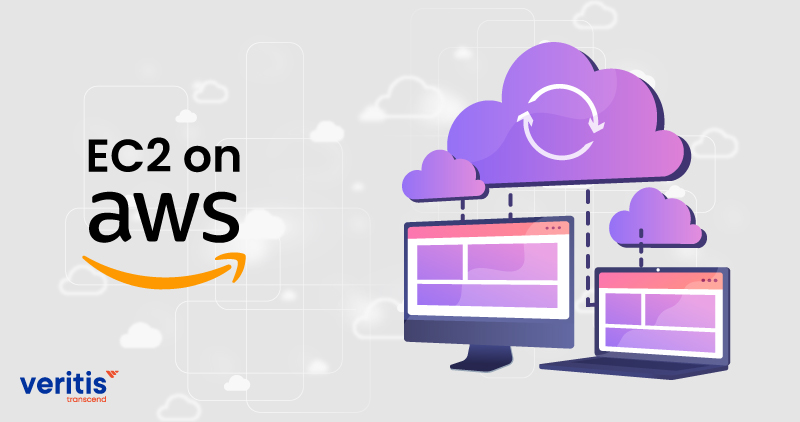
AWS EC2 is a powerful and flexible cloud computing service that provides resizable computing capacity in the cloud. With over 300 instance types, EC2 on AWS public cloud offers unparalleled flexibility, scalability, and cost-effectiveness. You can ensure optimal application performance and cost savings by carefully evaluating your specific requirements and choosing the right instance type. So, whether running a small web or large-scale enterprise application, EC2 is an excellent choice for your cloud computing needs.
A critical aspect of choosing the right EC2 instance types for your application is understanding the different instance families available. AWS ecosystem offers several families of instances optimized for specific use cases, such as compute-optimized, memory-optimized, and storage-optimized instances.
Compute-optimized instances are designed for applications that require high-performance processors. They are ideal for applications that require high performance for compute-intensive workloads, such as gaming, scientific simulations, and batch processing.
Memory-optimized instances are designed for applications that require large amounts of memory, such as in-memory databases and high-performance computing. These instances offer a high memory-to-CPU ratio, essential for these workloads.
Storage-optimized instances are designed for applications that require large amounts of local storage, such as data warehouses, Hadoop clusters, and log processing. These instances provide high disk throughput and low latency for these workloads.
In addition to these families, AWS offers general-purpose instances that balance computing, memory, and network resources for various applications. These instances are suitable for applications that do not require specialized hardware optimizations.
Once you have determined the appropriate instance family for your application, you can evaluate specific instance types within that family. AWS offers a variety of instance types within each family, each with its unique combination of CPU, memory, and network resources.
For example, within the compute-optimized family, AWS offers instance types such as the C5, C5n, and C6g. The C5 instances are optimized for compute-intensive workloads, offering high-performance processors and low-latency networking. The C5n instances build on the C5 instances, offering even higher networking performance with up to 100 Gbps of network bandwidth. Finally, the C6g instances balance high-performance processors and cost-effectiveness using Arm-based processors.
AWS public cloud offers instance types within the memory-optimized family, such as the R5, R5a, and R6g. The R5 instances are optimized for memory-intensive workloads, offering high memory-to-CPU ratios and supporting larger memory sizes. The R5a instances use AMD EPYC processors and offer a balance of cost-effectiveness and performance for memory-intensive workloads. The R6g instances use Arm-based processors and offer a balance of performance and cost-effectiveness for memory-intensive workloads.
AWS offers instance types within the storage-optimized family, such as the I3, I3en, and D3. The I3 instances are optimized for high-performance local storage, offering high disk throughput and low latency. The I3en instances build on the I3 instances, offering even higher performance with up to 60 Gbps of network bandwidth and support for NVMe-based SSDs. Finally, the D3 instances are optimized for distributed file systems, offering high disk throughput and low latency for large-scale data processing.
It’s important to note that choosing the right instance type also involves considering other factors beyond just CPU, memory, and network resources. For example, instances with larger memory sizes may be more expensive but provide significant performance benefits for memory-intensive workloads.
Similarly, instances with higher network bandwidth may be more expensive, but they may also provide significant performance benefits for applications that require high data transfer rates. Additionally, consider the availability and pricing of different instance types, as some may have limited availability or be more expensive during peak usage times.
Final Thoughts
Choosing the right EC2 instance type for your application requires careful consideration of your specific requirements and understanding of the different instance families and types available. You can ensure optimal performance, scalability, and cost-effectiveness by evaluating your needs and choosing the appropriate instance type. Veritis has enough expertise to develop and deploy AWS EC2 for clients with various requirements. From Fortune 500 to emerging companies, we have catered to companies of different magnitudes. So, contact us, and we shall bring an AWS EC2 solution that suits you best.
Got Questions? Schedule A Call
Also Read:
- What is AWS Identity and Access Management?
- Cloud News: Oracle becomes AWS Customer; Azure Eyes Space frontier with latest offerings
- Managing Kubernetes Applications Through Terraform and AWS EKS
- Amazon Web Services (AWS’s) Impressive Growth Fails to Fuel Amazon’s Profitability
- AWS vs Azure vs GCP: Cloud Cost Comparison
- Which Cloud has Better Private Connectivity: AWS or Azure or GCP?